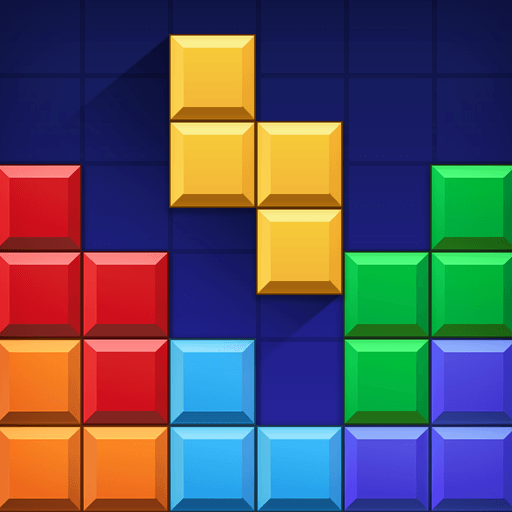Block Puzzle
BIG CAKE GROUP LIMITED
31 Oct 2019
1 Nov 2024
77.12 MB
19.0.31
6.0
10,000,000+
Description
A Game of Strategy, Skill, and Patience
Block puzzles have fascinated the brain and gained pleasure in adults and children. Whether you’re a casual player looking for a way to pass the time or a puzzle enthusiast seeking to challenge your cognitive abilities, block puzzles offer a satisfying blend of strategy, spatial reasoning, and relaxation. In this article, we’ll explore what block puzzles are, how they work, and why they remain such a beloved genre in the world of games.
Table of Contents
What Are Block Puzzles?
Conventional block puzzle is formed by a playing board (i.e., playing field) composed of blocks of different shapes, and participants need to fit a small number of blocks to fit into a certain structure. Aim of the game may vary for exact game that is being played, however, in general, the output of the game is to complete a multi dimension array through filling the array, deleting lines, or replicating the pieces in a manner that the parts form a shape or that there are no empty areas, like.
A task involving spatial knowledge, conceptualising, and anticipatory planning.

Block Puzzle – sanzeeapk.com
Why Are Block Puzzles So Popular?
Block puzzles have been a classic for decades, and the reasons for their persistence lie in: .
1. Simple Rules, Endless Possibilities
Simplicity is the reason why block puzzles are still successful today. The vast majority of block puzzles have rules which are simple and easy to learn, to the point that without significant effort on the player’s part practically any basic concept of the exercise can be easily understood by novices. For example, in Tetris, the player is required to move only falling blocks to create complete lines that disappear from the play field, providing a constant stream of new blocks.
Nevertheless, because of the basic nature of their mechanisms, block puzzles are, in large part, best thought of as an invitation to perform a considerable quantity of strategical thinking. Players will need to anticipate, plot their actions thoughtfully, and find solutions in the moment, resulting in a game that stays exciting and new, no matter the amount of play time.
2. Mental Exercise and Cognitive Benefits
Block puzzles are of course much more fun than that, but they are a very effective training tool for your brain. Playing these types of games helps improve:
– Spatial reasoning: Solving puzzles relies on knowing which shapes fit together and how to move them in order to create space.
– Problem-solving skills: Each step you make has the potential to lead either to the achievement of the solution of the puzzle, or to the implementation of an impossibility. This dynamic encourages critical thinking and planning.
– Memory and focus: In order to do the job well, players have to remember past plays and react to new situations, thereby developing their abilities in maintaining concentration and remembering patterns.
– Patience and persistence: Some puzzles require multiple attempts to find a solution informing the player not only of the value but also the pleasure that comes from retrying.
3. Accessibility and Relaxation
On the other hand, compared with most high-energy action games, block-puzzles have been shown to provide an act of high relaxation. The absence of time (and/or the time pressure of a timer makes its presence known can be overcomed) allows players to “relax” and “get caught up” in its problem-solving aspects completely. Whatever your schedule, block puzzles offer a casual, low-stress means to savour a few moments of decompression whether commuting, at work during a break, or relaxing after a hard day.
In addition, since most block puzzle games are playable on cell phones, tablets or computers, they are highly convenient for players with mobility issues. Short play sessions dotted with a handful of minutes every now and then are the ideal dose of mental stimulation without extended, uninterrupted gaps to fill.
Types of Block Puzzles
Although all block puzzles have a common theme of either moving or placing the blocks, there exists a wide range of variations and modes, that can be used to create shifts in experience. Some of the most popular types include:
1. Sliding Block Puzzles
In this context, the player manipulates blocks on a grid that is translocated to empty locations to remove a path or construct a design. Most clearly this can be demonstrated in Unblock Me, where the player needs to nudge coloured blocks so that a red block can get out of the box.
2. Fitting Blocks into a Grid
Games like Blockudoku combine elements of Sudoku and Tetris. Players need to fit different amounts of blocks in a 9×9 grid (without any overlap) and the target is to fill completely the rows and columns and clear them in order to gain space for new blocks (e.g.
3. 3D Block Puzzles
Another specific type, 3D block puzzles, challenges players to reconstruct a model in three dimensions. Such games may be richer in terms of elaboration by the additional dimension and, in general, rich in terms of diagrams and rewarding mechanics. On mobile telephones, examples of this more immersive form of game, e.g., 3D Block Puzzle, are good examples of this form.
4. Tetris-Style Puzzles
Tetris is the Godfather of all Block Games and remains hugely impactful. The goal is to rotate and displace descending blocks (tetrominoes) such that horizontal lines vanish. The complexity grows with the game speed, and participants must think on the fly “in real time” in order to not saturate the screen of blocks.
5. Jigsaw Block Puzzles
In some types of block puzzles, the task of the player is to follow a given picture or pattern (e.g., scrabble board) by placing corresponding blocks in sequence, all belonging to a particular pattern. These can also be meditative and enjoyable puzzler as you are solving piece by piece the final picture.
Tips for Mastering Block Puzzles
If you’re looking to improve your skills and progress further in your favorite block puzzle game, here are some helpful tips:.
– Plan ahead: If the next block is going to be different, don’t hesitate for too long to make a decision. Think several steps ahead to avoid getting stuck.
– Prioritize empty spaces: Aim to keep open spaces available for upcoming blocks. Put, do not be reluctant to put larger items, or more complicated items.
– Be strategic with rotations: In some games, you can rotate blocks. How components can be assembled to optimize space and minimize redundant movements can be thought through.
– Stay calm and patient: It is possible to make block puzzles difficult depending on the state of play. Take a step back, pause, and don’t hesitate to reset or experimentation with variations if stuck.
Conclusion: Why Block Puzzles Will Always Be in Style
they’re simple yet challenging, mentally stimulating, and incredibly accessible. Whether you’re looking for a quick distraction or a way to exercise your brain, these puzzles offer something for everyone. So, next time you’re looking for a fun and rewarding way to pass the time, pick up a block puzzle—your brain will thank you.
Have you played a block puzzle lately? Shared my favorite game and tips in the comments!
FAQs
Block puzzle is a kind of puzzle game in which the player sequentially arranges various shaped boxes to a grid, or to a certain pattern. The end goal may differ, but generally is about systematic placement of the blocks to occupy space, remove lines or complete a design without gaps. Popular examples include Tetris, Blockudoku, and Unblock Me.
Block puzzles have enduring popularity because they offer simple rules, yet provide endless challenges. The advantages are that They contribute to higher levels of mental ability, such as spatial reasoning, memory and problem solving, and they provide a stress reducing, relaxing experience. The games are easy to access, easy to play, and mentally stimulating, all without needing too much time.
Playing block puzzles can enhance several cognitive abilities, including:
Spatial reasoning: Players improve their ability to visualize how different shapes fit together.
Problem-solving skills: The need to think ahead and adapt to new situations helps develop critical thinking.
Memory and focus: Puzzles require players to remember previous moves and patterns, boosting concentration.
Patience and perseverance: *Block puzzles help us to develop resilience and perseverance by overcoming obstacles.
There are several types of block puzzles, including:
Sliding Block Puzzles: Players move blocks around a grid to clear a path or complete a goal (e.g., Unblock Me.
Fitting Blocks into a Grid: These puzzles involve fitting various shapes into a grid without overlapping e.g., Block Doku
3D Block Puzzles: These puzzles add complexity by allowing the blocks to move in three dimensions.
Tetris-Style Puzzles: In *blocks, they fall, and need to be rotated and put together so they create unbroken columns that vanish, such as with Tetris .
Jigsaw Block Puzzles: The goal is to assemble a picture or design by fitting blocks together in a specific pattern.
General gameplay in block puzzles consists of the movement of blocks to complete a grid or a pattern. Specific mechanics depend on the game you’re playing:
But in Tetris, you turn tumbling blocks to form complete lines.
In Blockudoku, you fill rows and columns with blocks, which are put into a 9×9 grid.
In Unblock Me, the player slides blocks to open a way for the red block to get out.
Games generally require thinking out moves in advance, matching blocks to the right shape, and progressively more challenging puzzles.
To improve at block puzzles, consider these tips:
1.Plan ahead: Think a few steps ahead before placing each block.
2.Prioritize empty spaces: Keep open spaces to fit future blocks, especially larger ones.
3.Experiment with rotations: *Rotate the blocks and find out how they fit best in the experimental space.
4.Stay patient: If you get stuck, take a break and return with a fresh perspective.
Yes! Most block puzzles are supposed to be enjoyable and stress-free, not those with time limits. Puzzling can be meditative, because it prompts a focus of awareness and mindfulness and provides a respite from the demands of ordinary life.
Absolutely! Block puzzles are suitable for any age, from pre-schoolers who are learning to solve problems, to adults looking for brain stimulation and mental challenges. Due to the simple mechanics and the multiple degrees of difficulty, they are appropriate for players of any age.
Indeed, several block puzzle games have been released in the mobile device market. Some popular options include Tetris, Blockudoku, Unblock Me, and Jigsaw Puzzle Block. These games have the capability to be played on smart phones and smart pads, and are ideal for playing on the move.
Block puzzles rest on spatial thinking and shape arrangement, which is not the same as word or number puzzles. They are also often such that the player is challenged to think in three dimensions(in many cases)or to make a few steps ahead. Their simplicity combined with depth is a satisfying temptation without overwhelming the player.
Yes! As with any skill, as you play block puzzles you will come to become better and better at identifying patterns, enhanced spatial reasoning, and on devising ways of accomplishing the puzzles efficiently. All games have a learning component, and the more you play the better you will become.
There are block puzzle games in most app stores (such as the Apple App Store and Google Play Store available. Just type the name of the game (e.g., Tetris, Blockudoku, Unblock Me to download to your device. Most of these games are free-to-play with optional in-app purchases.
Yes, most block puzzle games can be played offline. That is, they are ideal for play on the move, on the go, on the commute, or anywhere that internet is unavailable.
If you’re new to block puzzles, starting with a simpler game like Tetris or Blockudoku is a good choice. These games are easy to understand and progressively increase in difficulty, helping you build your skills gradually.
It depends on the game. Certain block puzzles e.g., Tetris do have a time constraint whose difficulty increments over the course of the game. Some, such as, Blockudoku have no time limit, so you can have your time and solve puzzles, whatever pace you want. You can typically choose games that match your preferred playstyle—whether you enjoy a relaxed experience or something more fast-paced.
What's new
1. Optimized the performance of this Tetris-Style block puzzle game. 2. Added some new art resources in this block puzzle game.




